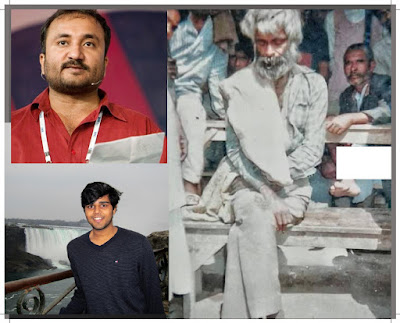What Led To Bloodbath In The Buddhist Land Of Myanmar
The world is watching the on-going ‘Rohingya Crisis’ in the Rakhine state of Myanmar, the epicenter of the tension. As of now, more than 1.1 million Rohingya Muslims have been affected and thousand stranded and forced to leave their homeland. About 73,000 thousand Rohingya Muslims have fled to Bangladesh since 9th October after an insurgent group attacked Burmese border police posts, charging a crackdown in which troops have been accused of murder and rapes. The Rohingyas were also accused of gangrape and murder of Buddhist woman in Rakhine province.
Myanmar Military has said that more than 400 Rohingyas have died in the violence in Rakhine region. Buddhist-majority Burma calls it ‘ethnic cleansing’, while Rohingya human rights activists countered that as many as 1,000 civilians have been massacred by the government soldiers. Over 2,625 houses have been burnt down. The Telegraph UK reported that new satellite imagery depicts the collateral destruction of a Muslim village, and raised serious concerns about level of devastation in Northern Rakhine state may be far worse than originally thought.
Rohingyas are considered as the most ‘persecuted’ Muslims in the world. The de-facto Leader and state counselor Aung San Suu Kyi is now on target of many human rights organization as she is the flag bearer of peace in the world. The Nobel peace prize laureate is now being criticized by many Islamic countries for not standing against the brutality on the Rohingyas Muslims. The government has blamed the Arakan Rohingya Salvation Army (ARSA), the insurgent pact that launched attacks on Myanmar military check posts one week ago.
Meanwhile, an estimated of 40,000 Rohingya Muslims living in India, are illegal immigrants. Now the government has planned to deport all of them. But deporting them back to the place where they fled from doesn’t seem a very safe option for the Rohingya Muslims. Union Minister of state for Home Affairs Kiran Rijiju said, “As far as we are concerned they are all illegal immigrants. They have no basis to live here. Anybody who is an illegal immigrant will be deported”.
In a major setback to the Rohingya Muslims, the Burmese government has cut down all the aids provided by the United Nations, including refugee camps, food, sanitation and other basic amenities. Now the world awaits for the next update on Rohingya crisis but the roots of this turmoil lies in the history of Myanmar which has different versions.
Why This Crisis and Who are Rohingya Muslims
The Buddhist-majority government of Myanmar framed new citizenship laws in 1982 after getting independence from the British rule. Close to 90% of the Myanmar population are Buddhists. Myanmar never could accept the Rohingyas as part of their culture and ethnicity. For the last 35 years, they have been living technically homeless and stateless. Only 40,000 Rohingyas are treated as citizens in Myanmar.
Rohingya Muslims, called as the Boat People, claim that their ancestors have lived here before 1948. So technically they should be acknowledged as the citizens of Myanmar. The Myanmar government in this regard asks them to provide documents dating back 1823 to prove it. Myanmar government considers the Rohingyas as Bengali as they were brought to Burma during British Burma time. British went back, may be forgotten, left these people behind.
When British left India, Rohingyas wanted the Rakhine state to be merged with Eastern Pakistan (Bangladesh). They approached Mohammad Ali Jinnah with this request. Jinnah refused the request quoting it as an internal matter of Myanmar.
Deprived and left aloof, Rohingyas concentrated at Rakhine and Myanmar remained hostile to this group. The government didn’t grant their citizenship rights and also voting rights. In 2012, in a skirmish between Rohingya Muslims and Burmese, at least 100 Rohingyas were killed. It led to sense of hatred among the Rohingya Muslims and the formation of ARSA. On 25th August, they launched an attack on Myanmar police posts killing more than 15 policeman and 15 civilians. This escalated the tension between them leading to ‘ethnic cleansing’ by Myanmar army. Houses were burnt, thousands of Rohingyas have been persecuted and many fled to the neighboring border of Bangladesh in search of refuge.
Dhaka now refused to accept more refugees citing their over population crisis. Prime Minister Sheikh Haseena said to BBC, “We are already an over populous country, cannot afford more. It is a matter of national security.”
Nobel Laureates Condemns Aung San Suu Kyi
Nobel peace prize laureate Aung San Suu Kyi is being widely criticized for her stand on the Rohingya violence. She has said, “We have to separate terrorists from the civilians.” She has defended the governments stand at many occasions. Now her fellow Nobel laureates have condemned her to be idle on this violence when the world awaits her strong revolutionary remark which she is known for. Desmond Tutu has appealed Suu Kyi to end the violence against her country’s Rohingya Muslim minority. The 85 years old archbishop said in heartfelt letter to Suu Kyi, “I am now elderly, decrepit and formally retired, but breaking my vow to remain silent on public affairs out of profound sadness”. He further criticized the Nobel laureate in the strongest words, “Your emergence into public life allayed our concern about violence being perpetrated against members of the Rohingya. It is not ethnic cleansing, it is genocide.
Nobel laureate Malala Yousafzai also condemned Suu Kyi for her vow of silence on the Rohingya violence. She urged the global community to intervene to protect the Myanmar Minority Muslims. “We need to wake up and respond to it- and I hope Aung San Suu Kyi responds as well,” she further resorted.
Modi’ Visit to Myanmar and India’s Stand on Rohingyas
Prime Minister Narendra Modi went to Myanmar but it seems that he didn’t touch the volcano of Rohingyas violence. He also stated that this is an internal matter of Myanmar. State Minister Kiran Rijuju has cleared that India is not bound to accept any international law when there is internal national security is concerned. He also slammed the international organizations to criticizing India for ‘harsh’ policies. He added, “We cannot throw them in Indian Ocean or shoot them to deport, we are identifying them to deport.”
Most of the Rohingyas in India are registered under United Nations High Commissioner for Refugees (UNHRC), known as UN refugee agency. The Centre has stated that it has started the deportation process for Rohingyas but Aung San Suu Kyi has said that it is not going to be easy to Myanmar to accept these Rohingyas back in Burma. Rohingyas are mostly concentrated in Jammu & Kashmir. Few extremist organization and the separatists are alleged to provoke and brainwash these refugees.
Now the ‘Jews of the East’, the Rohingyas, are being read and watched by the world but despite so much of writing, criticism and uproar, the violence is increasing in Myanmar.
(Originally written in 2017).




Comments
Post a Comment